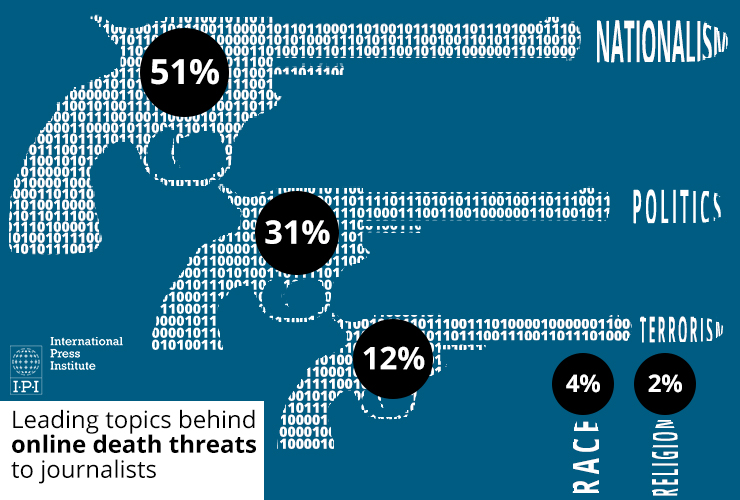In Turkey, words such as “traitor” and “terrorist” appear frequently in violent threats directed against journalists on social media as part of campaigns led by supporters of the country’s ruling Justice and Development Party (AKP) .
IPI’s interactive database of online abuse against journalists, part of its Ontheline programme, collected 176 instances of violent threats against Turkey between January 2016 and January 2017. These include direct death threats, rape threats, threats of other physical harm, implied threats and threats to others, such as a journalist’s relatives.
The trigger for these incidents are often articles or comments that can be interpreted to contain criticism of Turkey as a nation or criticism of the government or the AKP – a dynamic that is likely to see a spike amid the emotional battle for voters ahead of Turkey’s April 16 constitutional referendum, a campaign already being waged in starkly binary terms.
An analysis of the themes underlying these 176 threats shows that approximately half of them are motivated by nationalism or “patriotism” (e.g., they frequently label journalists “traitor” or “terrorist”). Thirty percent appear to respond to criticism of policy decisions by the government or the AKP, and around 12 percent react to media coverage of terrorism or terrorist acts. The remaining threats are related to the journalist’s perceived religion or race.

Source: International Press Institute (IPI) Ontheline Database.
In one case, Asli Aydıntaşbaş, a columnist for the secular daily Cumhuriyet, criticised a government-imposed broadcast ban following a bombing in Istanbul’s Beşiktaş district on Dec. 10 that claimed 48 lives. Aydıntaşbaş posted on Twitter: “Immediate media ban on the explosion in Istanbul, as we were scrambling to find out what exactly happened…”. Shortly thereafter, she began to receive vitriolic comments and threats.
@asliaydintasbas sen ve destekçileriniz yaptı. Ülke karışacak. Ve öngörüm o dur ki devletin söz geçiremediği Türkçüler sizden intikam alacak.
@asliaydintasbas you and your supporters have done this. There will be commotions in the country. And my prediction is that those nationalist Turkists, which the state can no longer influence, will get their revenge against you.
Media bans following a terror attack are not unusual in Turkey and are defended by authorities as public safety measures that prevent attackers from reaching their goal of terrorising the public. Journalists who oppose such bans are frequently labelled as “traitors” by government supporters and AKP trolls.
On Dec. 15, Bekir Coşkun, a journalist with Sözcü, shared on Twitter an article critical of the Turkish government’s reaction to news that the Turkish lira had fallen to historic lows against the U.S. dollar. Turkey’s President Reccep Tayip Erdoğan blamed the currency’s decline on foreign powers bent on destabilising the country. Coşkun’s share was met with several threats.
@cosknbekr2 @gazetesozcu dünya sizin gibi ne yavşak ne hain ne ibne ne dönme ne şerefsiz ne ahlaksız görür lan size yağlı urgan bile çok
@cosknbekr2 @gazetesozcu bekir the world has never seen an asshole, traitor,fag, transsexual and ignoble like you. Even the hangman’s knot is too valuable for you.
AKP supporters are also seen to react strongly against critical coverage of the war in Syria, where Turkey is actively involved, as well as the war against Kurdish militants in south-eastern Turkey. On Dec. 15, BirGün columnist Erk Acarer commented on his Twitter account: “If it was not enough to turn Gaziantep into Al-Raqqah, we can make Antalya into Aleppo.”
AKP trolls threatened him with death, accusing Acarer of provoking the public and spreading terror propaganda.
@eacarer kimlen yapıyon lan bu işi terörist bozuntusu, demek kışı damda geçirmek istiyon.sabırlı ol,yanacaksam önce seni yakarım
With whom are you doing this job you “would-be terrorist”? It seems like you want to spend the winter in prison. Be patient. If I am going to burn, I will burn you first.
The trolls threatened to report Acarer’s comments to Turkey’s General Directorate of Public Security. That agency has called on the public to report, either through its @EmniyetGM Twitter account or the agency’s official website, anyone who disseminates “terror propaganda” on social media. Authorities intensified those calls following the July 2016 coup attempt.
These examples provide a glimpse into an online culture in Turkey in which pro-government journalists and AKP trolls promote and practice attacks on journalists and others perceived to take critical stances on matters related to the Turkish state, politics and terrorism.
